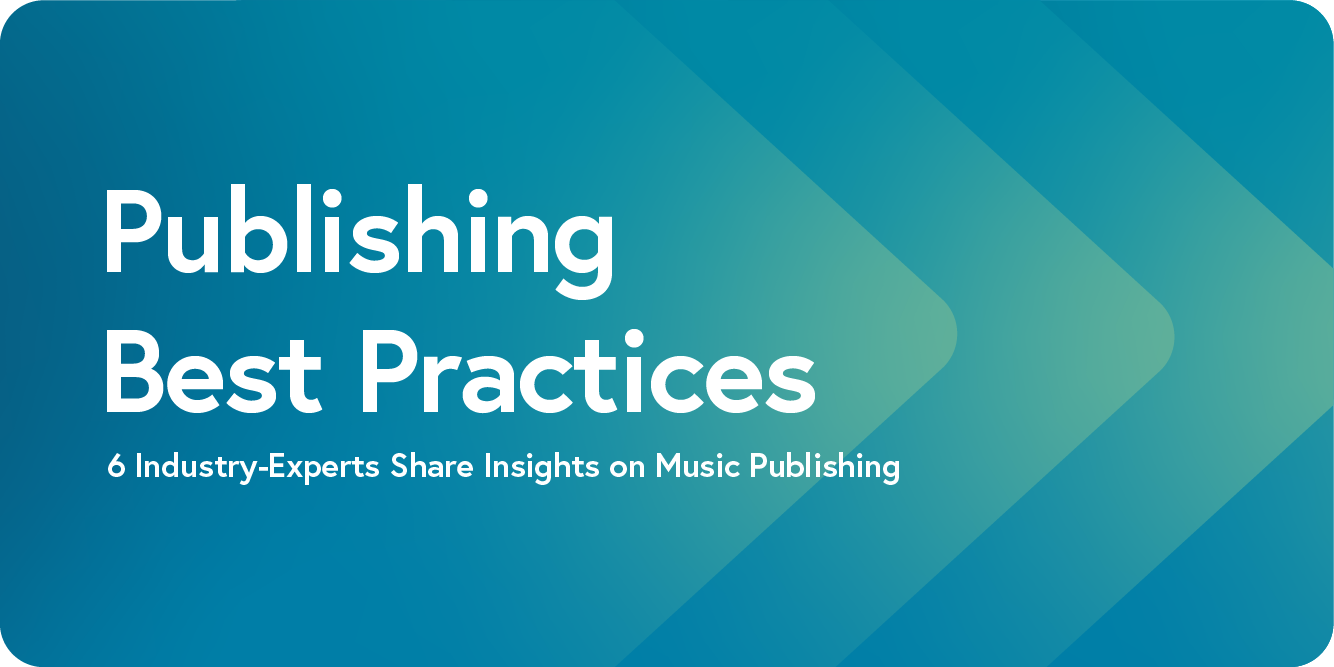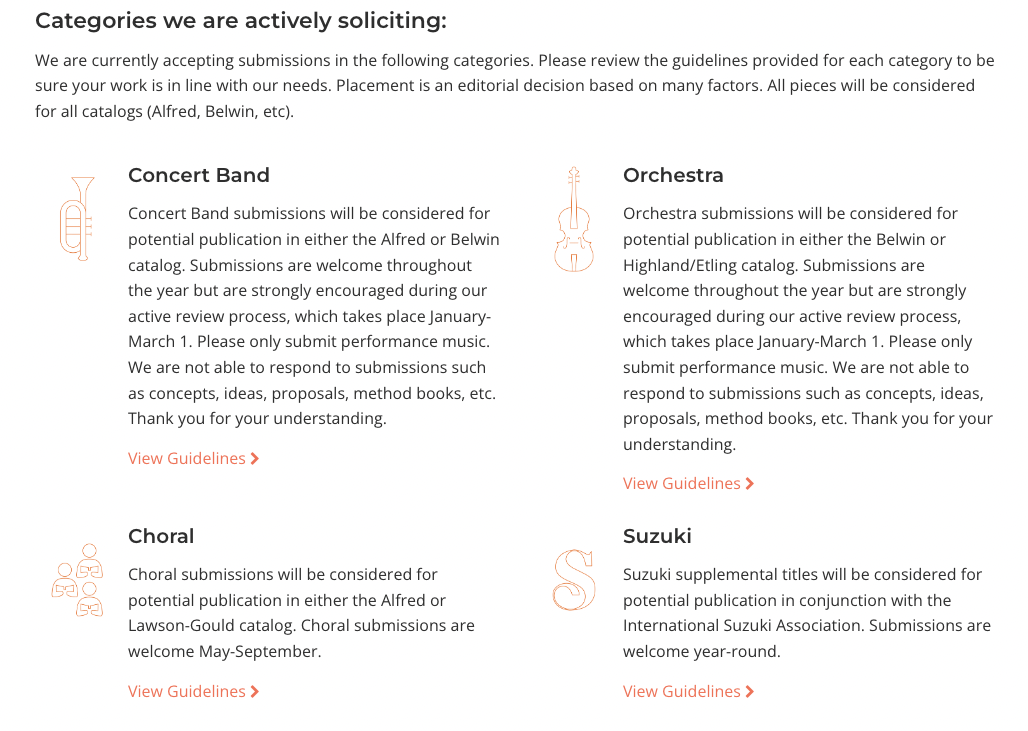
The world of music publishing is one that can seem confusing when you are first trying to make a name for yourself, but it doesn’t have to be. This blog post is based on a panel discussion we hosted with top editors, publishers, and conductors who came together to share their expert advice about the publishing process.
Hear from editors about what they look for when selecting new music for publication; gain tips and tricks from composers about how to create a clean and professional score; learn what a conductor searches for when programming music for a performance.
The Experts
Providing their insights on how to get published is an expert panel of publishers, composers, and directors. Combined, they have been published hundreds of times by many different companies, have written music for all experience levels from grade school to Broadway, and programmed and directed shows for all age levels.
Here is the panel:

Tyler Arcari
Instrumental Music Editor
Excelcia Music Publishing

Chris Bernotas
Director of Instrumental School Methods and Repertoire
Alfred Music

Andrew Glover
President
C. L. Barnhouse Co.

Carol Brittin Chambers
Composer and Owner
Aspenwood Music, LLC

Jason Loffredo
Composer, Arranger, Orchestrator, Copyist
Creator of Conquering Finale

David Kish
Director of Bands and Professor of Music
Metropolitan State University of Denver
Step #1: The Composition
Whether you’re starting a piece from scratch or arranging an existing piece, it’s important to know the context and intended use of the music. Is this going to be performed for an audience, or used educationally? Will it be played by professionals or less experienced musicians? Will you be hand-writing the score or composing directly in Finale (or a different music notation software)? These are some of the most important questions before you start composing music for publication.
According to Chris Bernotas, “presentation matters, but content is key.” More than anything, publishers are looking for great talent and pieces that will sell to their audiences. To know if your music has a chance to be published by a specific publisher, it’s important to look at the music that a publisher has put out already and see what pieces you have created that are similar, and where they may fit within a publisher’s catalog.
While the music itself is of the utmost importance, publishers are also looking for pieces that are easy and enjoyable to read and play. Visually, they will be looking for aspects of the notation that may trip a player up in practice or performance, so presentation of the notation does matter.
To streamline the creation of playable, beautiful notation, it helps to use a great music notation software (like Finale!) and to have a set templates to work from. While some publishers have their own templates and house styles that they use, it is not required to use them when submitting your music for publication. It will help to have your own master template and subtemplates for specific scenarios (for example, a theater-style template). Publishers will sometimes have templates that correspond to the musical need as well (like instrumentation for grade level 2).
Step #2: The Submission and Editorial Process
So once your music is written, how do you submit the music to publishers for review?
Many publishers have a music submission page that explains what they are looking for from music creators and how to submit their pieces. Check them out! Publishers will tell you exactly what type of music they are looking for. For instance, here is the music submission page for our publishing partner Alfred Music. Submissions will often require the music notation file, PDF, and MP3 to be submitted for review.

The example above is from the Alfred Music submission page
Andy Glover of C.L. Barnhouse describes what his company is looking for when selecting music:
“The ideal submission would fill a number of boxes for us. [As a] for-profit publisher, anything we accept for publication, we have to have a reasonable expectation that we will make money on this piece. But beyond that, we’re looking for things that have a teachable or programmatic purpose. Something that a teacher will use in a classroom that will help their students go from one level to another. It’s also important that a student would enjoy working on a piece. Teachers are always looking for ways to keep kids engaged in band.”
It’s also important to remember that there is a lot of music being created and submitted for publication. Publishers are looking for unique pieces that are really outstanding.
Here are a few more aspects to know when submitting your music:
- The review process for publishing can be time consuming – be patient!
- Don’t turn in a rough draft. You should consider the piece “finished” before you submit it. However…
- When a piece is accepted, the process is just starting. Editors will go back and forth with the composer to work on aspects of the piece to make it stronger.
- You need to be willing to work with the editors.
- Remember, editors only want to make a piece stronger and help it sell when offering feedback. No one is trying to hurt the music.
- On the other hand, if you didn’t receive feedback initially, you can always ask for it from the editors.
- Don’t take “rejections” personally. Publishers can pass on music for a variety of reasons – it doesn’t mean the music is bad. Use it as a time for reflection.
Step #3: Bringing the Music to Life
Now that your music has been written, submitted, edited, and published, it’s time to bring it to life. This is where the band director, ensemble leader, or teacher comes in, as their focus is on planning the performance and selecting the music that will be played. When programming a concert, the music needs to appeal to the ensemble. Director of Bands David Kish says “It doesn’t matter how good I am at rehearsing, if I select a piece of music that just doesn’t ‘hit’ with the ensemble for whatever reason, it just doesn’t work.”
David also considers three groups of people when programming:
- The ensemble or group, who need to want to play it.
- The audience, who needs to enjoy and take something from the performance.
- The director (himself), and what he needs personally to grow as a teacher.
Frequently Asked Questions
Do I need to submit a recording with my music when submitting to a publisher?
A recording isn’t required, but it is helpful. If you are submitting a recording, the built-in playback within the music notation software should work. However there is a benefit to a live recording of the piece if you can get it – it helps you understand if the music is actually playable. Sometimes written music is too difficult to be played, and if it can’t be played, it can’t be published.
What happens to your copyrights when your piece is accepted by a publisher?
When your music is accepted by a publisher, you do give up the copyright of your music. In exchange you receive a royalty, as well as other benefits, such as:
- Printing and other expenses covered
- Marketing and music store placements
- Licenses and third-party licensing
How does self-publishing work?
While there are many benefits to having your music published by a major publishing company, at times you may want to publish the music yourself. One of the biggest benefits of self-publishing is the ownership of 100% of your royalties. This can mean you make more money on your music if it becomes popular, but you also incur all of the expenses, such as the cost of printing, discounts for dealers, and more.
Final Pieces of Advice
- David Kish: “[As a programmer] I have to choose music that they are in love with. I have to find music that I’m in love with, and when I do that, the music comes alive.”
- Jason Loffredo: “Present something that is as professional as possible. Sometimes that has to do with how you’re using Finale, but a lot of time it has to do with knowing the rules of music notation. If everything is correct, it puts a good impression on the people you’re submitting it to. That makes a big difference. If it looks professional, you’re a step ahead.”
- Carol Brittin Chambers: “Learn the market that you want to be in. Do your homework. Talk to band directors, go to rehearsals, and get feedback from publishers and learn from it.”
- Andy Glover: “Composers should be brutally honest with themselves. When you’re writing a piece of music, don’t always rely on feedback from your spouse or your friends. Your students are going to be more candid than your friends and family. You really need to look at yourself and your music from an objective place, which can be hard as a composer. If you think you’ve got what it takes, persevere. Don’t give up.”
- Chris Bernotas: “Separate yourself from the piece. [Feedback] is not a personal attack. You have to be able to step away from a piece when you’re finished and then re-evaluate. That objective review, and being resilient and true to your voice is really important.”
- Tyler Arcari: “Remember why you write music. It doesn’t matter if you get published or not. First you have to write music you like, then you have to have fun doing it. If not, what’s the point?”
If you want more insight on the publishing process, check out our Publishing Best Practices webinar:
These publishing resources are also available: